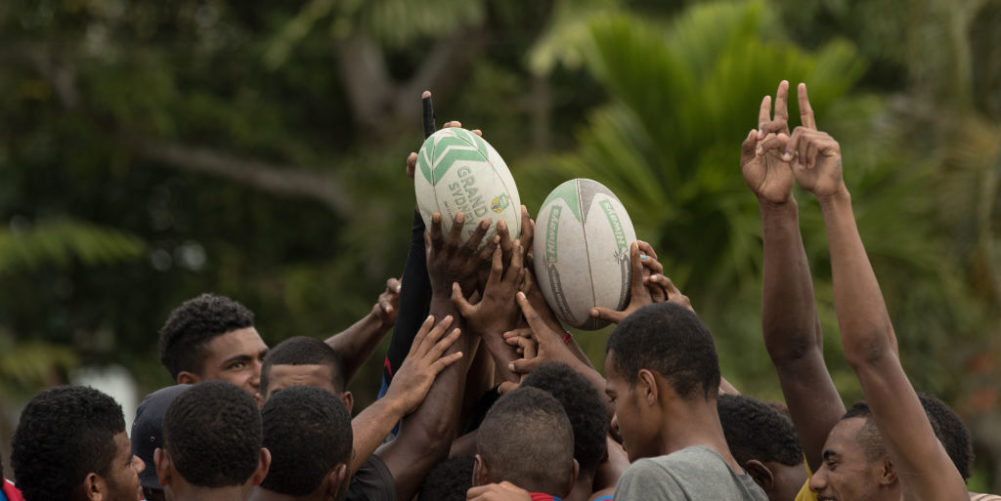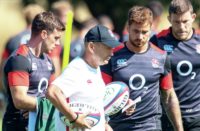THANK God for Dan Leo whose championing of Pacific Island rugby reaches new heights this weekend with the release of his documentary Oceans Apart – greed betrayal and Pacific rugby.
I would urge you to watch it – on Amazon or Youtube – because rugby still has no real self-awareness of the systematic exploitation, harvesting and abuse of Samoa, Fiji and Tonga. Shamefully the movers and shakers still turn a Nelsonian eye.
The former Samoa back five forward has spent the best part of three years – at his own expense – moving around the rugby world to interview all and sundry to give an objective snapshot of what the reality is.
His documentary is beautifully produced and edited by Callum Drummond and Axel Haudiquet and gives a real flavour of the countries and people involved as well as the rugby issues.
Leo stays objective and does not spare the Pacific Island Unions themselves and the governments and corrupt military regimes that hold sway although, as everybody knows deep down, the problem is directly related to the way they have been excluded from the financial model that drives world rugby.
That is what makes them vulnerable and why they must go round their poor countries with a begging bowl and get involved with unscrupulous politicians and plain ‘wrong uns’.
Interviewees include Fiji Sevens coach Ben Ryan, former Fiji captain Netani Talei, Lima Sopoaga, an All Black with Samoan heritage, Manu Tuilagi, Pat Lam, Inga Tuigamala, Frank Bunce and Charles Piutau. There are particularly awkward encounters with World Rugby CEO Brett Gosper and Tuilaepa Sailele Malielegaoi, the Samoan Prime Minister, who is also chairman of the Samoa Union. The latter once stated that Leo should be in a mental institution for his views. It is much to Leo’s credit that he remained civil with the old fossil.
The documentary offers suggestions rather than definitive answers and it is possible to admire Leo without agreeing with everything he says or proposes.
I have, for example, voiced my worries in this column before as to the potential downsides of proposed changes to the eligibility ruling allowing Pacific Islanders and players of Pacific heritage to represent two nations. It was interesting that Mako Vunipola was also voicing such doubts in midweek.
Initially such a proposal sounds a no-brainer but how will this actually work in practice? Such legislation would give the big boys even more licence to buy up and coerce the most promising young islanders and to squeeze them dry of their rugby juices before throwing the islands a bone and jettisoning them.
Such a situation could seriously hack off those who stayed loyal to the islands, relying on a pretty good but not stellar, income from club contracts around the world to support their families back home only to lose their places in the national team to much wealthier returnees from well rewarded Test careers.
There is a great brotherhood among island players and taking pleasure in one man’s success but I would suggest such generosity of spirit would soon run dry.
Not all those returning would be of the quality of Charles Piutau who is always the example cited. The Bristol full-back walked away from New Zealand rugby five years ago when he was still, unaccountably, some way short of being a regular All Black starter. He could earn much more playing club rugby in Europe than he could as an All Black squad member.
And let’s get real. Even if the islands get first dibs on a true home-grown superstar or player with Pacific heritage based elsewhere, the big boys would have even more license to make an offer that individual couldn’t refuse. They just take, they can’t help themselves when it comes stocking their larders. Ireland is a very wealthy rugby nation full of brilliant homegrown players yet yesterday at Twickenham they started with five ‘bought’ up project players from abroad. The mindset of modern day Test rugby is badly awry.

World Rugby could and should outlaw the practice of academy players from the islands – most notably Tonga – who have been forced to sign contracts when playing abroad forbidding them to play for their country of origin which is positively medieval.
Overall rugby continues to look at the symptoms not the cause, it refuses to address the disease itself. Rugby’s powerbrokers refuse to govern the game in a manner in accordance with the finer principles which guide all clubs and teams from the bottom up all around the globe. They have let the sport down badly and if they continue they could destroy it. In 20 years’ time Test match rugby could be an odd niche sport that refused to embrace others as equals, share the mutually-earned spoils and grow.
The Six Nations and SANZAR stand in the dock. The sport of Empire and Imperialism, the game that offered apartheid South Africa succour, still views the islands as rugby quarries to be ruthlessly mined.
Emerging nations are treated as upstart threats not fellow travellers and dismissively labelled Tier 2 and 3. The stink of segregation and the ‘grading’ still hangs in the air.
There has always been a fear of bringing the Pacific Islands into the fold – they are too good – there is no desire for equality and fraternity. “Give us a hand up not a hand out” pleaded the great Inga Tuigamala in one telling aside midway through the documentary.
How can we have got this so wrong? If you stopped and considered Test and World Cup rugby, as a new start up industry the Islands would be massive stakeholders. Upwards of 18 per cent of all Test players are Islanders or of Pacific island heritage, they fill stadiums all around the world while sometimes on a match fee of less than £100 a game. Many World Cups would be a yawn without them. No professional club operates without its contingent of islanders, nor many of the leading nations.
They are a huge part of rugby’s brand and modern day DNA yet currently they have virtually no voting power – a complete disgrace and almost certainly illegal should the World Rugby Constitution be challenged – no earning power as a national union, no kudos or prestige. And increasingly, you sense, no hope.
The self-serving, self-appointed cartel and overlords of the Six Nations, New Zealand, Australia, South Africa need to change their attitude or destroy the game.
It won’t be easy but to borrow from Orwell and 1984: “You must try harder. It is not easy to become sane.” Rugby badly needs a large dose of sanity before it’s too late.
























